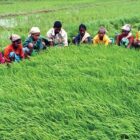It is time that farmers set the nation’s farming agenda, focused on genuine farming issues without letting manipulative politicians reap benefits from false promises
It is not a little curious how the addiction to power guides and motivates politicians. It is even more curious to observe how current and former politicians manage to sustain themselves in power, defying the biblical saying: ‘For they sow the wind and they shall reap the whirlwind’ (Hosea 8:7), as it were. They never pay a price for their false promises. Miraculously, they get themselves rehabilitated by creating controversies to divert public attention from the real issues or cloak ordinary issues with such great significance that people are beguiled into believing that great things are in store for them. Typically, when veteran politicians cannot solve a problem, they create a bigger problem or issue so that people forget the earlier crisis, as has often been the case with Indian agriculture.
Meanwhile, in India, the gap between promise and performance in the farm sector remains bewilderingly large. For some curious reason, foreign direct investment (FDI) in multi-brand retail has been made a huge political issue with heated debates around how great a reform measure it will be and how it will change things for Indian farmers. Amidst all the heat and dust around what percentage of FDI will be allowed, a very simple fact seems to have been overlooked: FDI is not a reform measure at all. Indeed, it has nothing to do with agriculture reforms that have suddenly been equated with FDI in a national political debate in which everyone, the debater included, is clearly confused.
FDI is merely an investment policy notification and cannot, by any means, be equated with or confused with critical agriculture reforms that India needs. FDI in itself is an investment opportunity and just that. There is no guarantee that investors will jump at the opportunity. Consider the example of 100 per cent FDI that is permitted in the cold storage sector but has so far attracted zero global investment. The answer lies in the fact that the investment is not considered lucrative in a world where private investments are motivated by profits and only profits. Profits in the current context come from front-end operations. Investors, thus, look at front-end investments and try to avoid back-end investments.
It is commonly accepted that the Indian farmer is bereft of choice. He has to sell at the mandi and, in a monopsonistic world, accept what the buyer offers. Again in a system in which everybody is entitled to a profit, the farmer seems to be the odd man out. Prices may go through the roof but the farmer does not get a share of the higher price that the consumer pays. All that the farming community is asking for now is a share of the proceeds that is commensurate with its efforts. It is not against others in the value chain making profits; it is worried about being able to sustain itself.
In the FDI context, this can be reasonably achieved if every prospective retailer with an investment of ₹5 crore mandatorily purchases 75 per cent of the agriculture produce sold in the retail store directly from the farmers. A big league player seeking to tap the huge Indian market for profits should be required to make such a social investment commitment. Hopefully, FDI, with the mandatory farm purchase rider, will provide a healthy competition amongst buyers allowing the farmer to leverage it into securing better prices for his produce; for some profit to directly trickle down to him. This would bring about some reform in the system.
Indeed, there are several levels of farm sector reforms that have become critical and if FDI is to benefit farmers, it makes sense for it to follow agriculture reform and not vice-versa. FDI per se is of no major significance for farmers because FDI in multi-brand retail is not about uplifting the farmer’s lot. Nor are farmers in a position to influence the course of FDI notification or force any new legislation. Indeed, there is no united farmers lobby because of divisions amongst farmer ranks, which is another major problem that the farming community must address.
The other and perennial problem, of course, is with farming conditions in India; in the current year, especially with the unpredictability of the rains. Travelling through Rajasthan last month, one was confronted with the complexity of monsoon behaviour and its impact on the farming community. One week of drought-like situation was quickly replaced by the thunderous applause from the rain gods, ushering in joy across the board; wiping out the despair over government apathy, at least temporarily.
Fortunately for Indian agriculture, the rains have arrived even if late. Rains and droughts are a matter of life and death for the Indian farmer; they represent the difference between surviving and contemplating suicide for farmers dependent on rain. This has been the case from time immemorial. There is so much in common in the circumstances obtaining at the beginning of the end of the Mohenjo Daro civilisation and in north-west India and Pakistan of today, in terms of climate change implications and future water availability.
These, far more than FDI, are matters of consequence to the farmer; these are the greater dangers, looming large over the farming horizon that policy makers are blissfully ignorant about. The Bharat Krishak Samaj will examine these concerns on the pages of Farmers’ Forum and other fora. They encompass farm energy, phosphorus in soil, water, nitrogen and potash use in agriculture; issues that critically impact Indian agriculture. It is time that farmers set the nation’s farming agenda, took affirmative action for Indian agriculture, focused on genuine farming issues without letting politicians of all hues use the farmer for electoral gains, without ever contributing to genuine farming gains.




